[This memoir essay appeared in the magazine Science 82 in April 1982, and in my 1982 book Infinity and the Mind. It’s based on the “Conversations With Godel” documented in my previous post. Some of the photos are from a recent trip through the West, others from the 1970s.]
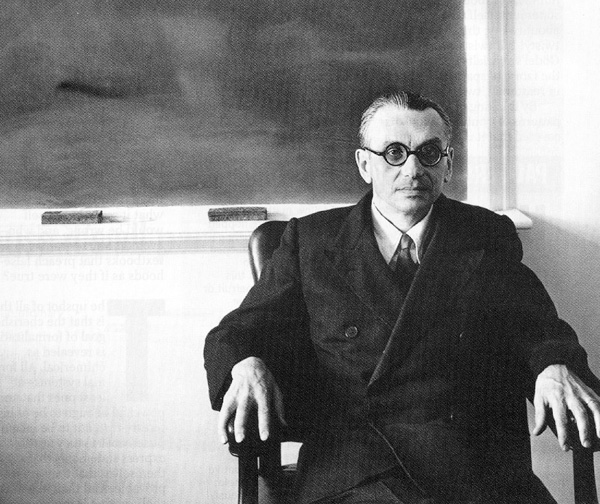
[This is a cropped version of a photo by Arnold Newman.]
I didn’t know where his real office door was, so I went around to knock on the outside door instead. This was a glass patio door, looking out on a little pond and the peaceful woods beyond the Institute for Advanced Study. It was a sunny March day, but the office was quite dark. I couldn’t see in. Did Kurt Gödel really want to see me?
Suddenly he was there, floating up before the long glass door like some fantastic deep-sea fish in a pressurized aquarium. He let me in, and I took a seat by his desk.
Kurt Gödel was unquestionably the greatest logician of the century. He may also have been one of our greatest philosophers. When he died in 1978, one of the speakers at his memorial service made a provocative comparison of Gödel with Einstein … and with Kafka.
Like Einstein, Gödel was German-speaking and sought a haven from the events of the Second World War in Princeton. And like Einstein, Gödel developed a structure of exact thought that forces everyone, scientist and layman alike, to look at the world in a new way.

[Alley in Elko, Nevada, 2012]
The Kafkaesque aspect of Gödel’s work and character is expressed in his famous Incompleteness Theorem of 1930. Although this theorem can be stated and proved in a rigorously mathematical way, what it seems to say is that rational thought can never penetrate to the final, ultimate truth. A bit more precisely, the Incompleteness Theorem shows that human beings can never formulate a correct and complete description of the set of natural numbers, {0, 1, 2, 3, . . .}. But if mathematicians cannot ever fully understand something as simple as number theory, then it is certainly too much to expect that science will ever expose any ultimate secret of the universe.
Scientists are thus left in a position somewhat like K. in The Castle. Endlessly we hurry up and down corridors, meeting people, knocking on doors, conducting our investigations. But the ultimate success will never be ours. Nowhere in the castle of science is there a final exit to absolute truth.
This seems terribly depressing. But, paradoxically, to understand Gödel’s proof is to find a sort of liberation. For many logic students, the final breakthrough to full understanding of the Incompleteness Theorem is practically a conversion experience. This is partly a by-product of the potent mystique Gödel’s name carries. But, more profoundly, to understand the essentially labyrinthine nature of the castle is, somehow, to be free of it.
Gödel certainly impressed me as a man who had freed himself from the mundane struggle. I visited him in his Institute office three times in 1972, and if there is one single thing I remember most, it is his laughter.
His voice had a high, singsong quality. He frequently raised his voice toward the ends of his sentences, giving his utterances a quality of questioning incredulity. Often he would let his voice trail off into an amused hum. And, above all, there were his bursts of complexly rhythmic laughter.
The conversation and laughter of Gödel were almost hypnotic. Listening to him, I would be filled with the feeling of perfect understanding. He, for his part, was able to follow any of my chains of reasoning to its end almost as soon as I had begun it. What with his strangely informative laughter and his practically instantaneous grasp of what I was saying, a conversation with Gödel felt very much like direct telepathic communication.
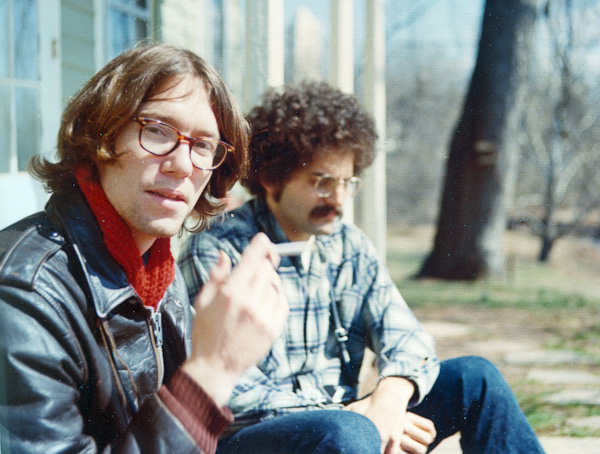
[Rudy with Roger Shatzkin near New Bunswick, New Jersey, 1973.]
The first time I visited Gödel it was at his invitation. I was at Rutgers University, writing my doctoral thesis in logic and set theory. I was particularly interested in Cantor’s Continuum Problem. One of Gödel’s unpublished manuscripts on this problem was making the rounds, and I was able to get hold of a Xerox of a Xerox of a Xerox.
I deciphered the faint squiggles and thought about the ideas for several months, finally giving a talk on the manuscript at Rutgers. I had a number of questions about the proof Gödel had sketched and wrote him a letter about them.
He probably would not have answered—Gödel almost never answered letters. But I happened to be attending a weekly seminar at the Institute with Gaisi Takeuti, an eminent logician who was there for a year’s research. Gödel knew this, and one day while I was at the seminar in Takeuti’ s office, he phoned up and asked that I come see him.
Gödel’s office was dim and unlit. There was comfortable carpeting and furniture. On the empty desk sat an empty glass of milk. Gödel was quite short, but his presence was such that visitors sometimes left with the impression that he was very tall.

[Folding chair at a tourist cabin in Lee Vining, California, 2012.]
When I saw him he was dressed as in all his pictures, with a suit over a warm vest and necktie. He is known to have worried a great deal about his health and was always careful to keep himself well bundled-up. Indeed, in the winter, one would sometimes see him leaving the Institute with a scarf wrapped around his head.
He encouraged me to ask questions, and, feeling like Aladdin in the treasure cave, I asked him as many as I could think of. His mind was unbelievably fast and experienced. It seemed that, over the years, he had already thought every possible philosophical problem through to the very end.
Despite his vast knowledge, he still could discuss ideas with the zest and openness of a young man. If I happened to say something particularly stupid or naive, his response was not mockery, but rather an amused astonishment that anyone could think such a thing. It was as if during his years of isolated thought he had forgotten that the rest of the human race was not advancing along with him.
The question of why Gödel chose to live most of his life in splendid isolation is a difficult one. Although he was not Jewish, the Second World War forced him to flee Europe, and this may have soured him somewhat on humanity. Yet, he loved life in America, the comfortable position at the Institute, the chance to meet Einstein, the great social freedom. But he spent his later years in an ever-deepening silence.
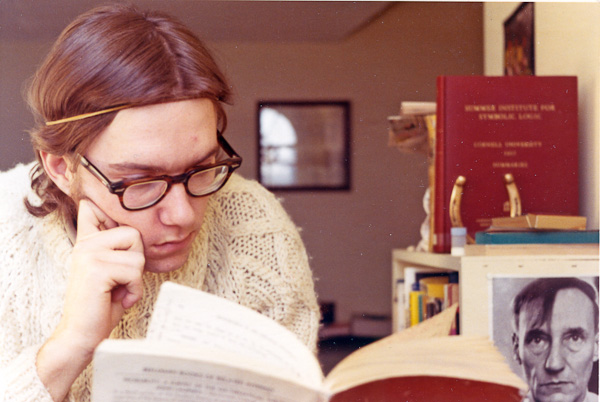
[Rudy studying P.J.Cohen’s book on set theory in Highland Park, NJ, 1970, with photo of Wm. Burroughs in background.]
The first time I saw Gödel, he invited me; the second two times, I invited myself. This was not easy. I wrote him several times, insisting that we should meet again to talk. Finally I phoned him to say this again.
“Talk about what?” Gödel said warily. When I finally got to his office for my second visit, he looked up at me with an expression of real dislike. But annoyance gave way to interest, and, after I’d asked a few questions, the conversation turned as friendly and spirited as the first. Still, toward the end of a conversation, when he was tired, Gödel would sometimes look at a visitor with an eerie mixture of fear and suspicion, as if to say, What is this stranger doing in my retreat?
Gödel was, first and foremost, a great thinker. The essence of the man is not to be found in his physical description, but rather in his ideas. I would like to describe now some of our discussions on mathematics, physics, and philosophy.
One of Gödel’s less well-known papers is a 1949 article called, “A Remark on the Relationship Between Relativity Theory and Idealistic Philosophy.” In this paper, probably influenced by his conversations with Einstein as well as by his interest in Kant, Gödel attempts to show that the passage of time is an illusion. The past, present and future of the universe are just different regions of a single vast spacetime. Time is part of space-time, but space-time is a higher reality existing outside of time.

[Windmills in the desert, Route 6, Nevada or Utah, 2012.]
In order to destroy the time-bound notion of the universe as a series of evanescent frames on some cosmic movie screen, Gödel actually constructed a mathematical description of a possible universe in which one can travel back through time. His motivation was that if one can conceive of time-travelling to last year, then one is pretty well forced to admit the existence of something besides the immediate present.
I was disturbed by the traditional paradoxes inherent in time travel. What if I were to travel back in time and kill my past self? If my past self died, then there would be no I to travel back in time, so I wouldn’t kill my past self after all. So then the time-trip would take place, and I would kill my past self. And so on. I was also disturbed by the fact that if the future is already there, then there is some sense in which our free will is an illusion.
Gödel seemed to believe that not only is the future already there, but worse, that it is, in principle, possible to predict completely the actions of some given person.
I objected that if there were a completely accurate theory predicting my actions, then I could prove the theory false—by learning the theory and then doing the opposite of what it predicted. According to my notes, Gödel’s response went as follows: “It should be possible to form a complete theory of human behavior, i.e., to predict from the hereditary and environmental givens what a person will do. However, if a mischievous person learns of this theory, he can act in a way so as to negate it. Hence I conclude that such a theory exists, but that no mischievous person will learn of it. In the same way, time-travel is possible, but no person will ever manage to kill his past self.” Gödel laughed his laugh then, and concluded, “The a priori is greatly neglected. Logic is very powerful.”
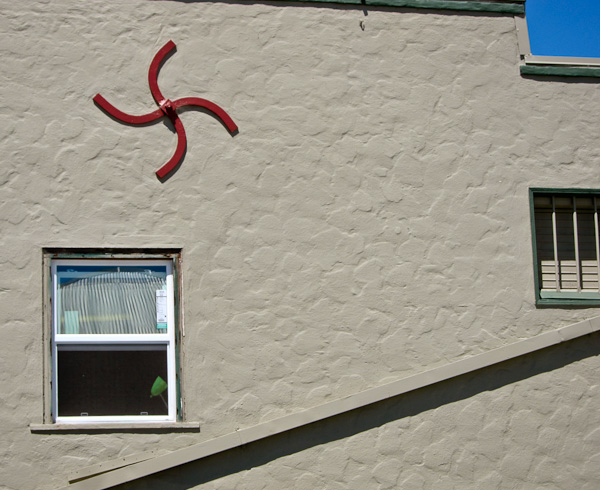
[Wall brace in San Juan Bautista, CA, 2012.]
Apropos of the free will question, on another occasion he said:
“There is no contradiction between free will and knowing in advance precisely what one will do. If one knows oneself completely then this is the situation. One does not deliberately do the opposite of what one wants.”
As well as questions, I also brought in for Gödel’s enjoyment some offbeat theories of physics I had come up with recently. I was quite satisfied when, after hearing one of my half-baked theories, he shook his head and said, “This is a very strange idea. A bizarre idea.”
There is one idea truly central to Gödel’s thought that we discussed at some length. This is the philosophy underlying Gödel’s credo, “I do objective mathematics.” By this, Gödel meant that mathematical entities exist independently of the activities of mathematicians, in much the same way that the stars would be there even if there were no astronomers to look at them. For Gödel, mathematics, even the mathematics of the infinite, was an essentially empirical science.

[Road work near eastern part of Route 50, Nevada, 2012.]
According to this standpoint, which mathematicians call Platonism, we do not create the mental objects we talk about. Instead, we find them, on some higher plane that the mind sees into, by a process not unlike sense perception.
The philosophy of mathematics antithetical to Platonism is formalism, allied to positivism. According to formalism, mathematics is really just an elaborate set of rules for manipulating symbols. By applying the rules to certain “axiomatic” strings of symbols, mathematicians go about “proving” certain other strings of symbols to be “theorems.”
The game of mathematics is, for some obscure reason, a useful game. Some strings of symbols seem to reflect certain patterns of the physical world. Not only is “2 + 2 = 4” a theorem, but two apples taken with two more apples make four apples.
It is when one begins talking about infinite numbers that the trouble really begins. Cantor’s Continuum Problem is undecidable on the basis of our present-day theories of mathematics. For the formalists this means that the continuum question has no definite answer. But for a Platonist like Gödel, this means only that we have not yet “looked” at the continuum hard enough to see what the answer is.
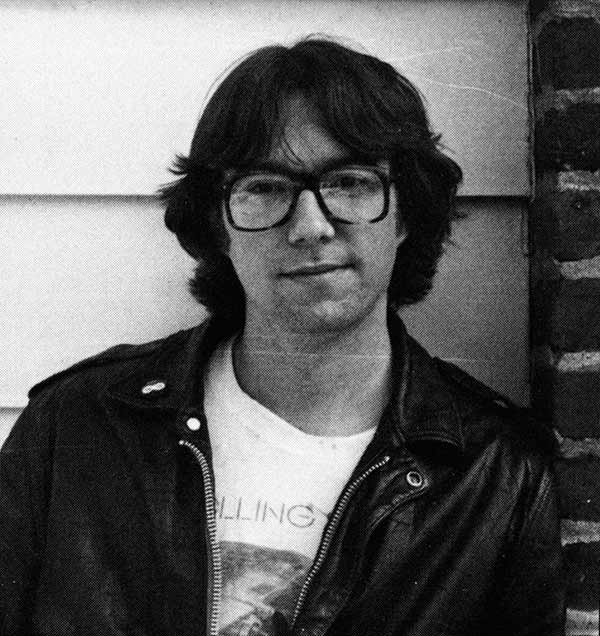
[Rudy in Lynchburg, VA, 1980, used as author photo for first edition of Infinity and the Mind.]
In one of our conversations I pressed Gödel to explain what he meant by the “other relation to reality” by which he said one could directly see mathematical objects. He made the point that the same possibilities of thought are open to everyone, so that we can take the world of possible forms as objective and absolute. Possibility is observer-independent, and therefore real, because it is not subject to our will.
There is a hidden analogy here. Everyone believes that the Empire State Building is real, because it is possible for almost anyone to go and see it for himself. By the same token, anyone who takes the trouble to learn some mathematics can “see” the set of natural numbers for himself. So, Gödel reasoned, it must be that the set of natural numbers has an independent existence, an existence as a certain abstract possibility of thought.
I asked him how best to perceive pure abstract possibility. He said three things, i) First one must close off the other senses, for instance, by lying down in a quiet place. It is not enough, however, to perform this negative action, one must actively seek with the mind, ii) It is a mistake to let everyday reality condition possibility, and only to imagine the combinings and permutations of physical objects—the mind is capable of directly perceiving infinite sets, iii) The ultimate goal of such thought, and of all philosophy, is the perception of the Absolute. Gödel rounded off these comments with a remark on Plato: “When Plautus could fully perceive the Good, his philosophy ended.”
Gödel shared with Einstein a certain mystical turn of thought. The word “mystic” is almost pejorative these days. But mysticism does not really have anything to do with incense or encounter groups or demoniac possession. There is a difference between mysticism and occultism.
A pure strand of classical mysticism runs from Plato to Plotinus and Eckhart to such great modern thinkers as Aldous Huxley and D. T. Suzuki. The central teaching of mysticism is this: Reality is One. The practice of mysticism consists in finding ways to experience this higher unity directly.
The One has variously been called the Good, God, the Cosmos, the Mind, the Void, or (perhaps most neutrally) the Absolute. No door in the labyrinthine castle of science opens directly onto the Absolute. But if one understands the maze well enough, it is possible to jump out of the system and experience the Absolute for oneself.

[In Grant park near San Jose, CA, 2012.]
The last time I spoke with Kurt Gödel was on the telephone, in March 1977. I had been studying the problem of whether machines can think, and I had become interested in the distinction between a system’s behavior and the underlying mind or consciousness, if any.
What had struck me was that if a machine could mimic all of our behavior, both internal and external, then it would seem that there is nothing left to be added. Body and brain fall under the heading of hardware. Habits, knowledge, self-image and the like can all be classed as software. All that is necessary for the resulting system to be alive is that it actually exist.
In short, I had begun to think that consciousness is really nothing more than simple existence. By way of leading up to this, I asked Gödel if he believed there is a single Mind behind all the various appearances and activities of the world.
He replied that, yes, the Mind is the thing that is structured, but that the Mind exists independently of its individual properties.
I then asked if he believed that the Mind is everywhere, as opposed to being localized in the brains of people.
Gödel replied, “Of course. This is the basic mystic teaching.”
We talked a little set theory, and then I asked him my last question: “What causes the illusion of the passage of time?”
Gödel spoke not directly to this question, but to the question of what my question meant—that is, why anyone would even believe that there is a perceived passage of time at all.
He went on to relate the getting rid of belief in the passage of time to the struggle to experience the One Mind of mysticism. Finally he said this: “The illusion of the passage of time arises from the confusing of the given with the real. Passage of time arises because we think of occupying different realities. In fact, we occupy only different givens. There is only one reality.”
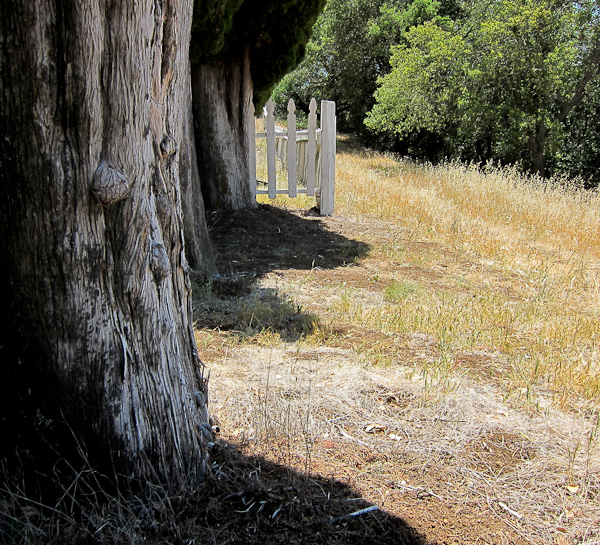
[Hidalgo cemetery in Almaden Quicksilver Park near San Jose, CA, 2012.]
I wanted to visit Gödel again, but he told me that he was too ill. In the middle of January 1978, I dreamed I was at his bedside.
There was a chessboard on the covers in front of him. Gödel reached his hand out and knocked the board over, tipping the men onto the floor. The chessboard expanded to an infinite mathematical plane. And then that, too, vanished. There was a brief play of symbols, and then emptiness—an emptiness flooded with even white light.
The next day I learned that Kurt Gödel was dead.









August 1st, 2012 at 8:01 am
The exact circumstances of Godel’s death are still hard to unravel. The official cause of death was given as “malnutrition and inanition caused by personality disturbance”.
http://drvitelli.typepad.com/providentia/2011/07/deconstructing-godel.html
August 1st, 2012 at 3:38 pm
The photographer Arnold Newman created the b&w image of Gödel at the blackboard. Also, Arnold Newman’s full photo shows (white) light streaming in from a window on Gödel’s right.
August 1st, 2012 at 5:20 pm
Hi Rudy,
Thank you for posting your reminiscences of Kurt Gödel. Fascinating reading.
Could you please expand a bit on your explanation of Gödel’s Incompleteness Theorem? Specifically, what do you mean by “a correct and complete description”? Thanks!
August 1st, 2012 at 8:13 pm
Roy, thanks for the reference to Arnold Newman for the Godel photo. I put the reference up into the main body of the post now. I found the uncropped version of the photo online, with light coming in from the side.
Romeo, thanks for the link to your essay on the sad circumstances of Godel’s death.
And, M, I don’t have the energy to explain Godel’s Incompleteness Theorem here, but you can learn a little more about it from my earlier blog post, “An Incompleteness Theorem for the Natural World”.
August 2nd, 2012 at 5:22 am
Godel was, I think, one of the few homans that terrified even the brightest minds of the 20th century. Was it von Neumann who sat down to talk to Godel who then replied that he simply didn’t believe in the physical sciences?
Me, I’ve always found Incompleteness rather liberating. This means that no model or picture someone else has of you can ever be complete: You can always do something that no one else could ever anticipate.
August 2nd, 2012 at 5:56 am
Wow. Amazing article. Thanks so much for posting this!
August 2nd, 2012 at 9:24 am
Well, wasn’t that a great read. Thanks for sharing your story. I especially enjoyed the reflections on consciousness – Reminded me of something Max Tegmark said once:
“I believe that consciousness is, essentially, the way information feels when being processed. Since matter can be arranged to process information in numerous ways of vastly varying complexity, this implies a rich variety of levels and types of consciousness. The particular type of consciousness that we subjectively know is then a phenomenon that arises in certain highly complex physical systems that input, process, store and output information. Clearly, if atoms can be assembled to make humans, the laws of physics also permit the construction of vastly more advanced forms of sentient life. Yet such advanced beings can probably only come about in a two-step process: first intelligent beings evolve through natural selection, then they choose to pass on the torch of life by building more advanced consciousness that can further improve itself.” — http://www.edge.org/q2007/q07_7.html#tegmark (Any thoughts on that perspective?)
August 5th, 2012 at 6:34 am
I love this post. Thanks Rudy.
August 5th, 2012 at 7:29 am
Rudy:
Thanks for this reflection on your time with Kurt Gödel, and the photographs of you in youth.
wrb
August 5th, 2012 at 9:28 am
Rudy, thanks so much for all the thoughts articulated here! I find that I am exactly in Goedel’s camp re: perceived reality and the oneness of everything. You are so brilliant to write simply and convey such complexity. And the photos are always such a gift.
October 15th, 2012 at 7:25 pm
What precisely is the translation of “this system is not consistent” inPM?
October 16th, 2012 at 9:24 am
Cliff, Sorry, but I’m not going to write out Principia Mathematica formulae! But I can tell you a little about what you seem to be asking.
If T is a clearly defined theory, and T includes number theory, then we can code up the formula “the sentence S is provable from T” as a statement Prov(T, S) in the language of T. If a theory isn’t consistent, then it actually proves everything, so we usually express “T isn’t consistent” as “T proves 0=1″ or Prov(T, ‘0=1’).
The sentence ‘T is consistent” is the more interesting statement, and this can take the form ~Prov(T, ‘0=1’), where ~ is the negation sign. “T is consistent” turns out to be a sentence that a consistent theory T CANNOT prove, and this fact is Godel’s Second Incompleteness Theorem.
November 13th, 2012 at 5:24 pm
Dmitiri, the quote from Tegmark is extremely elitist, especially the following:
“Yet such advanced beings can probably only come about in a two-step process: first intelligent beings evolve through natural selection, then they choose to pass on the torch of life by building more advanced consciousness that can further improve itself.”
In fact, reading the passage at the link you provided clearly shows where Tegmark wants to take some of us. I’m only left to wonder what will happen to the vast majority of humanity when such a superclass is “created”.
I guess God isn’t in Tegmark’s worldview. Speaking of God, it would be great if Rudy could publish a blogpost on Godel’s Ontological work.
November 23rd, 2012 at 5:42 pm
Given Godel’s proof that ‘it is impossible to demonstrate, within a mathematical theory, that this very theory is non-contradictory,’ Alain Badiou argues that: a reasonable ethic of mathematics is to not wish to force this point; to accept that a mathematical truth is never complete. But this reasonable thing is difficult to maintain. As can be seen with scientism, or with totalitarianism, there is always a desire for the omnipotence of the True.
Rudy, regarding the omnipotence of the True, is this why “some” are pushing for a purely computational worldview, for a computational system can’t be proven to be non-contradictory, and therefore, controllers of any such computational system can ineed maintain “omnipotence of the True”?
August 1st, 2013 at 8:35 pm
This piece is vibby goo. Panpsychism or BUST = ++WOW
August 3rd, 2013 at 10:32 am
This was a great article! I was unfamiliar with the idea that ‘possibility’ is an objectively real thing, that is a very, very interesting thought. I also agree that the passage of time is an illusion, but I don’t have the skills to try to prove this point, it just seems that it is so based on my experience.
August 27th, 2013 at 9:56 am
VEAN POR FAVOR POR GOOGLE LAS FALACIAS DE KURT GODEL DONDE SE DEMUESTRA QUE EL TEOREMA DE INCOMPLETITUD DE GODEL ES FALSO Y OTRAS MUCHAS CUESTIONES,UN SALUDO JUAN
August 27th, 2013 at 10:09 am
Juan, Having studied Goedel’s proofs very closely, I feel that for me to spend time looking for the flaw in a “refutation” of Goedel’s theorem would be as pointless as looking for the hole in the hull of a ship that I already know to be lying on the bottom of the ocean. And in any case, I don’t read Spanish very well. But I applaud the energy that you have put into your site, and I’m glad you’re thinking about these things.